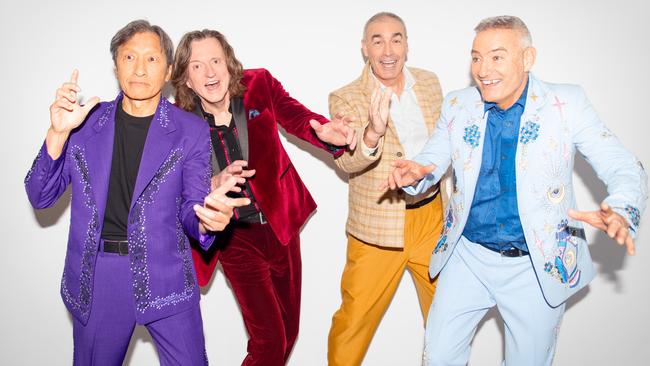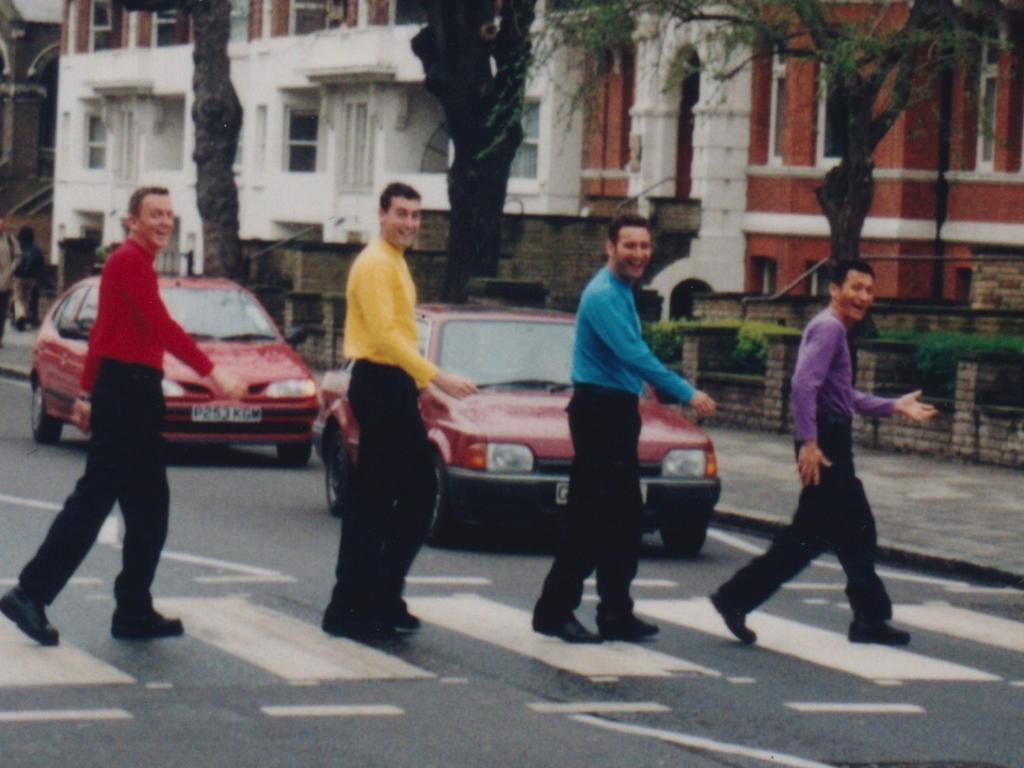‘In this country, we’re not good at celebrating our heroes’
Emmy-nominated director Sally Aitken talks about the ‘radical optimism’ of The Wiggles, who are the subject of her latest documentary.

Greg Page, best known to us all as the Yellow Wiggle, says he wasn’t prepared for the emotional ride of watching his life play back at him.
Page tells The Australian that there were “certainly some tears” after watching director Sally Aitken’s new documentary, Hot Potato: The Story of The Wiggles.
Aitken, a two-time Emmy nominee for her films David Stratton: A Cinematic Life and Shark Story, is the first person to ever comprehensively tell the story of the four skivvy-clad children’s entertainment heroes.
The loving film tracks the inconceivable rise of four friends from uni who, on a whim, recorded a children’s album in the early ‘90s and became one of the biggest Australian music exports in history. “These tickets were hotter than the Stones and Springsteen,” a US broadcaster says near the start of the film.
Page, who left the band in 2006 because of health issues, says that he expects people will find the film quite emotional “Because the connection people have to The Wiggles is a very personal one.”
“I can imagine there will be high emotions in some people when revisiting that time in their life when their children were young, and recalling those moments when they took them to The Wiggles live shows, or just watched them watching TV.”

Page says that it took watching the documentary for him to grasp the enormity of the group’s legacy. “For so long I was on the inside of it. To see it presented in a way where I’m looking from the outside in is quite amazing.”
“The fact I was such a big part of so many people’s lives is an incredibly privileged position,” he says. “I think that the documentary captures the essence of what The Wiggles were all about, and that is that the children were our priority.”
“That we were entrusted by parents to put their children in front of the content that we were creating is such a huge privilege.”

The film is filled with astonishing footage of The Wiggles’ reunion tour from last year, which saw the OG line-up reunite and play to packed-out stadiums of adults across the country. There’s a strange emotional potency to watching adults lose their inhibitions and sing the lyrics to ‘Big Red Car’ without a shred of irony. “I think at the very heart of us, we are children. You always have that link to who you were in those formative years of your life,” says Page. “The reunion show just proved that people want to relive their childhood and connect with that feeling.”
“The adults really do let loose, and that energy and electricity are so vibrant and infectious — you just can’t help but have a huge smile on your face.”
When asked why she wanted to make a film about The Wiggles, director Sally Aitken puts it frankly: “Who doesn’t want to make the most improbable story that ever existed?”
“It’s just such an amazing, unlikely success, and they’ve endured in the hearts of people around the world.”
Aitken says that she was shocked that the story had not been told before, but found out soon into the project that it was not through lack of trying — the band had been approached many times in the past. “I think that they’re at a stage where they’re ready to share their long journey and their ongoing relevance,” she says.

“They’re also just a great entertainment story. In this country, we’re not so good at celebrating our heroes, but these guys are Australian to the core. They’re self-deprecating, but they take what they do very seriously. They had a great intentionality when they began and that has continued.”
Her vision for the documentary, however, went beyond chronicling The Wiggles’ extraordinary success. Instead, she sought to capture the essence of their audience — the children whose lives were enriched by the band’s music. “It’s about the ways the group could connect with them and nurture them through a time in their lives and become an important part of who they are.”
Aitken says that she was moved by what she calls The Wiggles “radical optimism.”
“We live in a world that’s really fast. Our kids grow up fast, and there are all sorts of reasons to be concerned about the world,” she says, adding that the group are an antidote to the age of anxiety. “There is optimism at their core — and that is really subversive and powerful.”
Working on this film was a documentarians dream, says Aitken, because of the sheer amount of archival content that was at her disposal.
In addition to the hundreds of hours of footage of the group, Jeff Fatt, the Purple Wiggle, has had a running photography project since the early 90s in which he has taken a photo every single day. “We scanned everything,” Aitken says ecstatically. “I keep thinking that we need to do an exhibition of Jeff’s photos.”

The producers also sent a call-out for people who grew up loving The Wiggles to “dust off their VHS’s” and send in their home movies. “We got such lovely responses and really beautiful stories,” she says,
“I think that seeing the impact that The Wiggles had on people in their own homes is what is quite special about the documentary.”
Hot Potato: The Wiggles Story is available to stream on Amazon Prime.






To join the conversation, please log in. Don't have an account? Register
Join the conversation, you are commenting as Logout